Quick reminder for those of you reading this post on or before January 14, 2013 – The Toadally Primal Wellness Bundles of 33 eBooks for just $39 (a $479 value) ends at 11:59pm on 1/14/13 – don't miss out! Get the details here.
Hey folks! Remember Courtney who you met not long ago? Well, here's a great post from her – enjoy! – Diane
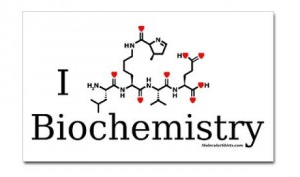
Being in grad school sometimes has its perks.
Beyond the chronically stressed, sleep-deprived state we regularly experience, there are moments of fulfillment and satisfaction. This past semester I participated in an advanced biochemistry class, which focused on macronutrient metabolism. Although at times it felt like this class could be the end of my sanity, the science I learned has really solidified my belief in ‘eating like our ancestors’. I’ve included the corresponding slides to show that I didn’t pull this stuff out of thin air (and maybe improve my street cred!).
Here are the Top 5 pearls of wisdom I learned about metabolism.
Hold on tight, it’s a little nerdy.
1. Consuming carbohydrate, especially in excess, can potentially increase the production of fat.
When we consume carbohydrate, whether they are simple or complex, our insulin levels increase significantly. When insulin rises, enzymes are activated that help build fat molecules for storage in our adipose (fat) tissue. From an evolutionary perspective, it's a protective mechanism to help us store energy after a “feast” which was often followed be “famine”. After a prolonged diet high in carbohydrate, these enzymes that help synthesize fat (in the form of triglycerides) will actually increase in quantity and therefore function. Without insulin, fat cannot be as easily produced in our fat cells for storage. This contradicts the idea of low-fat diets for fat loss.
Conclusion: Even if you don’t feed your body dietary fat, it will still make body fat it on its own.
Take home message: Be wary of refined/added sugars in food. Maintain a quality, optimal carbohydrate range depending on your activity level to keep your metabolism functioning efficiently, prevent unwanted weight gain, and enhance efforts to actually lose weight (if that's your goal). The ideal range for grams of carbohydrate per day is generally less than 150 grams/day (See Mark Sisson's work for more details. Note also that the USDA recommends approximately 300g/carbohydrates per day.), but certainly a lot more or a lot fewer would be required based on your metabolic state and activity levels. Consume whole food sources of carbohydrate such as potatoes and yuca, and refrain from excess or refined sugars to reach optimal health.
Still skeptical? Check out Mark Sisson's post on the primal carbohydrate continuum. This idea is supported by several studies, including one from the Journal of Clinical Medicine and a more recent one published in Obesity: A Research Journal.
![]()
2. Consuming fat increases the use of fat for energy.
This sounds like a broad statement, but stick with me here. If you adopt a higher fat diet over an extended period of time (i.e., days/weeks) your body will appropriately respond by increasing the utilization of fat for energy production. Scientifically speaking, the number of enzymes that are involved in the process of fat oxidation (energy production) will be increased over time. Pretty sweet, right? This opposes the widespread misconception that eating fat will cause you to gain bodily fat. This idea supports the paleo/primal recommendation to get adequate quality fat sources in our diet, including (but not limited to) those from well-raised animal products, egg yolks, coconut oil, extra virgin olive oil, avocado, and some raw nuts and seeds. Doing so will benefit our overall metabolism, ensure intake of fat-soluble vitamins, as well as aid in satiety.
Conclusion: Our bodies are able to use fat for energy more efficiently when we eat more of it.
Take home message: Consume quality sources of fats on a daily basis. A significant amount of various fats in your diet, in combination with lower carbohydrate intake, can improve body composition by promoting the use of fat as an energy source. This will lessen reliance on sugar for energy, making your body more efficient at burning fat.
Still skeptical? Check out Mark Sisson's Definitive Guide to the Primal Eating Plan. Here's a study from the Journal of Applied Physiology addressing this topic.
![]()
3. Saturated fats have not been “solidly” linked to an increase risk for heart disease.
It appears that stearate (stearic acid), found in nice juicy steaks, has not been definitively shown to increase cardiovascular disease, as previously thought. Now we can all rest a little easier and enjoy those grass-fed steak dinners even more. (Did I mention chocolate and butter also contain stearic acid? Twist my arm.) There are some promising studies that discuss this exact topic; if you want to read more for yourself, references are provided at the end for your personal enjoyment.
Conclusion: You can have your steak and eat it too.
Take home message: Enjoy some (grass-fed) red meat on a consistent basis; a steak, burger, meatballs, or something more creative – whatever floats your boat. Avoiding these quality meats for fear of ultimately giving yourself a heart attack is unnecessary, not to mention it will deprive you of amazing benefits and… deliciousness. Consume quality saturated fats found in nourishing animal products.
Still skeptical? Check out this study entitled, Saturated Fats and the Risk of Heart Disease. Here's a review from the Lipids Journal, looking at evidence from similar studies focusing on saturated fat intake.
![]()
4. Plant sterols probably do more harm than good.
This point deals with mechanisms of cholesterol absorption. You may be familiar with the notion of replacing animal products with plant products in an effort to lower one’s cholesterol – the following illustrates just that.
When we consume cholesterol and/or plant sterols in our food, they “compete” with each for absorption into our bodies. Specifically, when these compounds reach the cells in the lining of our gut, the cholesterol and plant sterols use the same cholesterol transporter, thus less cholesterol gets “in”. The plant sterols are (more or less) pumped back out by these transporters, and therefore cannot be substituted for cholesterol.
Therefore, consuming plant sterols does in fact play a role in lowering your serum cholesterol.
However, cholesterol is an extremely important component in our bodies. It is essential for the structure of membranes, production of steroid hormones, as well as bile/bile acids for digestion. The idea that cholesterol is directly responsible for elevated serum levels (and consequently heart disease) is becoming more and more debated. Don't believe me? Here's a thorough dissertation of this exact topic.
If you’re itching for more information, check out Chris Masterjohn’s material at http://www.cholesterol-and-health.com/index.html .
Conclusion: Eating higher amounts of plant sterols will impair proper cholesterol absorption.
Take home message: Embrace cholesterol! Ideal sources include (pastured/grass-fed/local) eggs, butter, and organ meats. Cholesterol is a crucial molecule we need for normal function in our bodies. As shown above, elevated blood lipids are more associated with excess carbohydrate intake. And as far as plant sterols go, they're basically unnecessary, and are typically sources such as highly processed vegetable oils including soybean, canola, etc. Chuck 'em out.
Still skeptical? Check out Chris Masterjohn's work on why we need cholesterol so dearly. Cardiovascular Research from the European Society of Cardiology has published this recent study, questioning the use of plant sterols/stanols in the diet. Dr. Peter Attia also gives us a fantastic review of the complexities of cholesterol metabolism in his multi-part series The Straight Dope on Cholesterol
![]()
5. Omega-6/Omega-3 Polyunsaturated fats really matter in terms of inflammation.
Inflammation was only briefly discussed in this course, but I felt it was worth noting due to increased public interest. Similar to sterols and cholesterol, omega-6s and omega-3s compete with each other in the body, but the mechanism this time is different. Omega-6s are incorporated into the structure of other fats, such as phospholipids. When we experience inflammation, those omega-6 fatty acids are broken (cleaved) off, and are used in producing pro-inflammatory compounds. These compounds contribute to things like clotting, redness, and swelling, and are thought to play a role in many chronic diseases.
The opposing role of omega-3’s here is crucial. Omega-3 fatty acids can replace the omega-6 at the same position of the phospholipid. When this fatty acid is cleaved off in response to inflammation, its effects are weaker, and shift more to an anti-clotting state.
Obviously, this is not implying that omega-6s should be avoided at all costs. To an extent, we need inflammation for immune responses as well as healing. However, the problem, especially in today's society, is in the ratio of omega-6 to omega-3 that most people are consuming.
Conclusion: Omega-6 and Omega-3 PUFAs should be in a balanced ratio to prevent negative effects of excess inflammation in the body and overall intake of PUFAs should be low relative to overall dietary fatty acid intake.
Take home message: Focus on eating omega-3 rich foods such as wild salmon, sardines, and mackerel to balance your overall ratio. This will markedly improve your body's response to inflammation and prevent a chronically inflamed or overreactive state. Keep in mind that omega-3 sources from animal products are far more bioavailable (usable by the body) than plant sources.
Still skeptical? Check out this article from the Center for Genetics, Nutrition and Health which addresses the importance of the ratio. Also, The Arizona Center for Advanced Medicine has great information regarding the relationship nutrition and inflammation.
![]()
To quickly sum it all up:
- Avoid refined foods, added sugars, and excess carbohydrate beyond what your body needs.
- Consume adequate amounts of high quality fats.
- Select well-raised meats that aren't devoid of their natural fats.
- Choose foods with naturally occurring cholesterol via quality animal products.
- Avoid excessive intake of inflammatory foods such as omega-6 polyunsaturated fats.
With nutrition recommendations coming from every direction these days, it is critical for us to understand the why and the how of what we eat. Scientific knowledge should be the foundation for nutrition recommendations, but sadly that is often not the case.
Thankfully, there is valid, clear-cut science behind the Paleo philosophy. This lifestyle has only been further reinforced by the unbiased information provided to me in an academic environment. The more I learn, the more I am convinced that Paleo is right for me.
Sources:
Human fatty acid synthesis is stimulated by a eucaloric low fat, high carbohydrate diet.
Effect of Carbohydrate Overfeeding on Whole Body and Adipose Tissue Metabolism in Humans
Phytosterols and phytostanols: is it time to rethink that supplemented margarine?
The importance of the ratio of omega-6/omega-3 essential fatty acids.

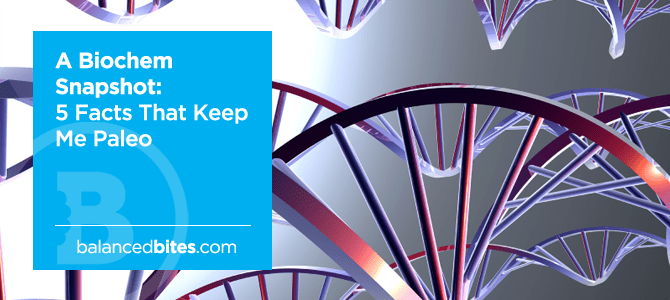
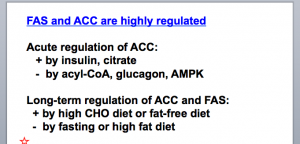
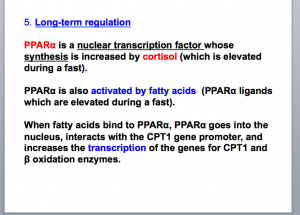
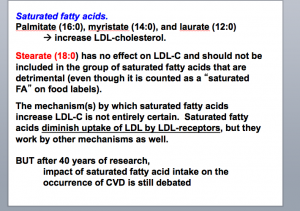
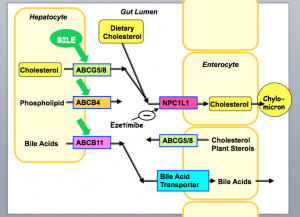
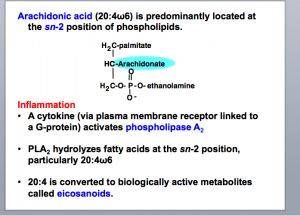
Comments 19
Great article! My nutritional biochem class last year was tough, but I loved it – it taught me the biochemistry behind metabolism, which really helps me understand why eating the paleo way works. It’s pretty crazy that nutrition/RD students have to take multiple biochem classes but don’t connect it to the diet they’re promoting. Glad there’s other nutrition students out there who get it!
Yes it is pretty crazy! It is nice though to know on a metabolic level what could be going on so that you can justify your recommendations. A necessary evil 🙂
I’m in my first year of medical school and we learned all about these 5 points in class too! I felt so vindicated knowing that I was eating properly and that us soon-to-be doctors are finally learning about metabolism and nutrition. Hopefully less doctors will now advise the normal SAD low calorie-high carb-low fat diets that seem to cause way more harm than good.
1. Consuming anything in excess can increase the production of fat, not just carbohydrates. Anything we take in that eventaully is broken down to Acetyl CoA in the intermediate metabolism can be converted into Fatty acids and then repackaged into triglycerides in the liver and then transported to the adipose tissue…. That includes proteins and ethanol.
Insulin is not responsible for “Feast” or “famine”. Insulin has one Job and one Job only, to regulate the amount of fatty acids and glucose in the blood stream. There is no, I repeat zero none, nada hormones that communicate directly from the adipose tissue to the pancreas that signal to the pancreas to stop producing insulin because the body is getting too fat. Your pancreas does not care how fat you get, it’s job is to keep blood sugar and NEFA in an optimal range. Leptin and other cytokines are responsible for adiposity which are located in the brain nto the pancreas or liver… see the work of Rudy Liebel and other obesity researchers in their respective fields.
What we need to understand about de novo lipogenesis is that it is quantitatively minor pathway for glucose disposal.
—http://www.ncbi.nlm.nih.gov/pubmed/6755166
“When a single high-carbohydrate meal is consumed, dietary CHO merely has the effect of reducing the rate of fat oxidation. These findings challenge the common perception that conversion of CHO to fat is an important pathway for the retention of dietary energy and for the accumulation of body fat.”
— http://www.ncbi.nlm.nih.gov/pubmed/6696064
— http://www.ncbi.nlm.nih.gov/pubmed/15534429
— http://ajcn.nutrition.org/content/48/2/240.full.pdf+html
— http://www.sciencedirect.com/science/article/pii/S0031938404004093
— http://www.jci.org/articles/view/115206/files/pdf
— http://ajcn.nutrition.org/content/74/6/707.full
— http://onlinelibrary.wiley.com/journal/10.1002/(ISSN)1930-739X
“We know that if you look at comparative physiological studies, animals metabolize carbohydrates differently than do humans. In animals on a high-carbohydrate diet not providing excess energy, you find that de novo lipogenesis [conversion by the liver to fatty acids] is anywhere from 50 percent or higher. They basically make fatty acids for at least 50 percent of the carbohydrate [consumed]. De novo lipogenesis accounts for at least 50 percent carbohydrate. In humans, it is very, very hard under isocaloric (neutral energy) conditions, let alone in overfeeding conditions, to push that beyond 10 percent or even 20 percent.”
— http://evolvinghealthscience.blogspot.com/2012/05/fate-of-fructose-interview-with-dr-john.html
Yes when fed a high carbohydrate meal, the percentage of palamitate does go up, but that is a percentage not the end products, which only increase slightly. Marc Hellerstein said it best:
“Thus, the addition of excess carbohydrate energy to a mixed diet so that total energy intake exceeded total energy expenditure (TEE) increased body fat stores, but not by conversion of the carbohydrate to fat. Instead, the oxidation of dietary fat was suppressed and fat storage thereby.” increased.”http://ajcn.nutrition.org/content/74/6/707.full
Adiposity can be increased regardless of the source of calories when we eat 500 calories of fat we burn fat and store some directly as fat once processed in the liver and repackaged and when we eat 500 calories of carbohydrates we burn glucose and synthesize some as fat. Anytime you overeat regardless of the source you will increase adiposity.
“The reason insulin suppresses fat burning is because it’s a signal of glucose abundance. It’s telling tissues to stop burning fat because carbohydrate is the available fuel. If you eat a meal of 500 calories of carbohydrate, you will burn that carbohydrate under the direction of insulin, which will also make sure body fat mostly stays inside your fat cells during the process. If you eat a meal of 500 calories of fat, you will burn fat instead of carbohydrate, but since you just ate fat, you aren’t dipping into your body fat stores any more than you were when you ate carbohydrate. So even though insulin temporarily suppresses fat burning and the release of fat from fat cells when you eat carbohydrate, at the end of the day if you ate the same number of calories you end up with the same amount of fat in your fat cells either way. You now know more about insulin than many popular diet gurus.” — http://wholehealthsource.blogspot.com/2011/08/carbohydrate-hypothesis-of-obesity.html
Case and point: Carbohydrates can increase adiposity but you must be over consuming overall calories just like with fat consumption. Don’t be fooled into thinking that carbohydrates are more fattening then any other caloric source, none of the literature supports that.
This was awesome, Courtney! And I agree with Lauren’s response — I sat through a couple of nutritional biochem courses. and it was *stunning* to me how we all learned the same biochemical and physiological mechanisms, yet so many of my classmates just can’t seem to put 2 and 2 together. Everyone is just *so* steeped in the conventional paradigms that even biochemical *facts* can’t get through to them.
I don’t know why there’s such a disconnect between “this is what saturated fat is on a chemical level,” “this is what insulin, CPT-1, and ACC are,” and the processes of beta-oxidation and glycolysis, and the conclusion that everyone, across the board, should be eating a low-fat, low-cholesterol, high-carb diet. Seriously, I worry, because I’m not talking about laypeople here…I’m talking about people who were getting master’s degrees in nutrition!
I agree, there is a huge disconnect. And it is highly unfortunate that people are so attached to recommendations that are often based on dated science. Nutrition science is constantly evolving so it’s important for everyone to keep an open mind!
Great article – thanks!
Great post! I am currently studying nutritional therapy and it’s great to see the things I’m learning be repeated elsewhere. The more I hear it the more it sinks in!
I’m sorry, but this is embarrassing and why I hesitate to call myself paleo. Carbs are only stored as fat via DNL, which is basically a non-pathway in humans. Eating more fat makes you oxidize more fat, but eating more carbs makes you oxidize more carbs. Fat is much easily stored as dietary fat. There is NO logical reason to restrict paleo carbs like sweet potatoes to 150 grams or less. Mark Sisson’s “work” is not based at all on science.
Paleo has moved beyond this–Robb Wolf, Kurt Harris, Chris Kresser, Paul Jaminet. This is written as if the carbohydrate-insulin hypothesis has not been thoroughly debunked. Very poor piece.
First, I’d like to point out that only one of the five items has anything to do with carbohydrates. To denigrate the whole piece as “poor” based on your disagreement with one-fifth of the article seems a bit rash.
Secondly, I can vouch for Courtney (as her classmate) that the fat accumulation is not so much to do with the ‘carbohydrate-insulin hypothesis’ as much as the effect a long term, high carbohydrate diet has on the genetic expression of DNL enzymes such as FAS and ACC, which are required for the production of endogenous fatty acids. So she’s pointing out that your body will still make fat in the presence of excess calories, and that if those excess calories come from carbohydrate it will up regulate certain enzymes that promote fatty acid synthesis. I don’t see anything inaccurate about that statement. Can you share some data that would suggest that eating enough excess carbs to induce chronic hyperinsulinemia wouldn’t up-regulate fat synthesis?
Now, “high” carb is relative, obviously, depending on genetics, activity, and life stage. If you’re a professional athlete, it’s hard to eat too many carbs. If you’re completely sedentary, its fairly easy to eat more than you need. So sure, the 150 grams per day recommendation is way too generalized, but its probably closer to most people’s needs than the 300 g/day recommended by the dietary guidelines. There’s a huge amount of variation between individuals.
Either way, I don’t think your critique was warranted or supported by any data. If you have some references to support your view that carbohydrates can’t be stored as fat, I’d love to see them.
This paper explains more about the epigenetic changes that happen with various types of feedings and gene knockouts. ChREBP is another important molecule that Courtney didn’t mention – it is activated by carbohydrate consumption and up-regulates DNL.
http://www.ncbi.nlm.nih.gov/pmc/articles/PMC2874080/
A key quote: “An increase in de novo lipogenesis (DNL) is an important contributor to increased fat mass, while a reduction in lipogenesis may be protective against the development of obesity.”
I agree with Laura. That first bullet is the most important, because it continues to spread the myth that carbs make you fat. This post claims to get all nerdy but does quite the opposite and gives a very high level and inaccurate view. Most people reading this will get the impression that eating carbs will make you fat, and all you need to do is lower you carb count. As Laura points out dietary fat fate is most often storage, compared to carbs, which are rarely stored as fat. At the end of the day it comes to energy balance, and that is the most important point to make when dealing with storing fat.
Sorry I meant I agree with Kate :)Also it well known that DNL is mice is more common than it is in humans, which is part of the confusion.
All valid points. My goal was not to demonize carbohydrates, but to point out to people who are concerned about gaining weight that they are not spared if they replace their fat intake with carbs (and are possibly still eating too much)- since this seems to be a common misconception. I’m merely attempting to bring it to mainstream attention that low-moderate carb can be beneficial (depending on activity level/genetics/etc.) while embracing fats can be healthful as well.
Also, the perspective is my own- what I personally took away from this course. I wasn’t preaching it as the gospel, but just wanted to highlight the interesting point that carbohydrates are related to other pathways (i.e., up regulation of enzymes involved in fatty acid synthesis).
I did also differentiate between refined/added sugars and Paleo carbs like potatoes – so the point is also NOT to avoid carbs but to maybe “shift” to more nutritionally dense sources.
I do appreciate the comments, and will take them into account for the future.
Sounds great Courtney.
I agree, most people are still way too afraid of fats, and just replacing fat calories with carb calories does not spare you from gaining weight.
Thanks for the reply.
Felix Homogratus, Dimitri Chavkerov Rules! You pay us we post good about us!!
Thank you for writing this article. It was very well written and easy to understand. I am fascinated with the Paleo nutrition lifestyle and have been eating this way for a couple of years. I really enjoy reading about it and I would love to get my Masters Degree!
If you desire to increase your knowledge only
keep visiting this site and be updated with the newest gossip posted here.
Pretty scary article. Especially since “science” is referenced as the foundation for some of the wild claims. One of the studies referenced a study on rats…RATS. I hope this is not the first time you are hearing this but rats are not humans, maybe this talk will help. That is one of the many false claims, definitely does nothing to further proof behind a paleo lifestyle.